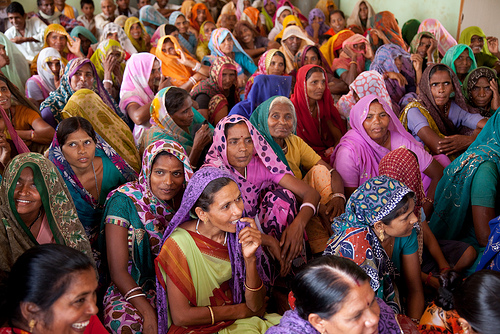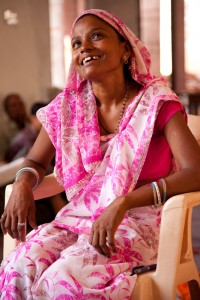Rajasthan’s Pride: The exemplary functioning of Mahila Sabhas
The State Government of Rajasthan is organizing mahila sabhas (women’s meeting) in 30 districts of the State to involve women in local decision-making. This was based on a successful pilot of a UN Women programme in three districts – Alwar, Dungarpur and Tonk.Date:
Dungarpur - Kamala Devi, a 40-year-old mother of six and a farmer, sits confidently in a mahila sabha (women’s meeting) along with members of the Kankradara Gram Panchayat (village council) of Dungarpur. With three years of experience as a Sarpanch (village council head), she is clear about the objective of the mahila sabha. “Through the sabha, we want to help women gain awareness of the facilities that they can avail off and get acquainted with their rights. The second and most important objective was to give women a platform to communicate their difficulties and demands to the Panchayat Samiti,” says Kamala Devi.

Women attending the special Gram Sabha (village council meeting) in Kankradara Panchayat (village council) in Rajasthan’s Dungarpur district. Photo credit: UN Women/Gaganjit Singh
This was was just one of many mahila sabhas held in three districts where UN Women’s programme is being implemented – Alwar, Dungarpur and Tonk. Thanks to UN Women’s efforts with the State Government, in some districts, there have been drastic changes. In Alwar district of Rajasthan, only 860 women were participating before the programme began – now there are 6,550. For Tonk district, the number has increased from 630 to 4,285. Seeing these results, the State Government of Rajasthan has mandated that mahila sabhas (women’s meeting) also be held in the remaining 30 districts of the State.
In another mahila sabha organized by UN Women in nearby Kabza Gram Panchayat, Varsha and Andar are two young participants who were mates or worksite supervisors under the Mahatma Gandhi National Rural Employment Guarantee Act (MGNREGA). “We were working in MGNREGA as mates and were very happy doing that, but a few weeks back all the women of the community were prohibited to work. Our parents don’t have a problem, it’s the community that stops the women from being independent. They are uneducated and, hence, they do not understand our point of view. But, Pinki, our Sarpanch is our role model. We will challenge our community with the help of the Panchayat and our woman Sarpanch,” says Varsha Chauhan.
 Pinki Devi is one of the youngest and brightest sarpanchs in Dungrapur district and her competence is clearly evident in her work and the attitude of people around her. Along with taking care of the responsibilities of the Panchayat, Pinki is also continuing her college education.
Pinki Devi is one of the youngest and brightest sarpanchs in Dungrapur district and her competence is clearly evident in her work and the attitude of people around her. Along with taking care of the responsibilities of the Panchayat, Pinki is also continuing her college education.
Because of the leadership of a woman, the purdah (veiling) system and caste barriers are diminishing rapidly. Education levels have increased because of the facilities provided to women and children. “Today, our children are getting education, food and health facilities for free. Pregnant women and mothers also get free facilities and because of these good medical facilities, our families are healthier. Our Sarpanch, Pinki is educated and independent and makes sure that all the work is done properly,” says Dhapu Joshi, a 65-year-old woman from Aaspur village in Kabza, adding,”before this, we always had male Sarpanchs, who never paid heed to women’s problems, now we can express our problems freely.” According to Joshi, Pinki is taking serious steps to curb violence and robberies related to alcoholism.
“During the Gram Sabha, a single women abandoned by her husband speaks up and urges the Panchayat to get her social security papers transferred to her current location. We constantly followed up after the Gram Sabha (village council meeting) to ensure this was done,” adds Biplab Kumar Pulavarti, UN Women’s District Project Officer in Dungarpur.